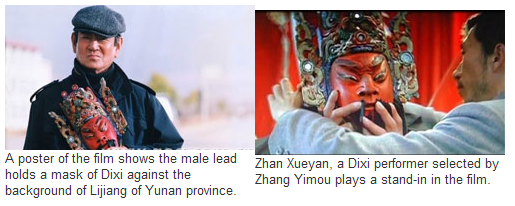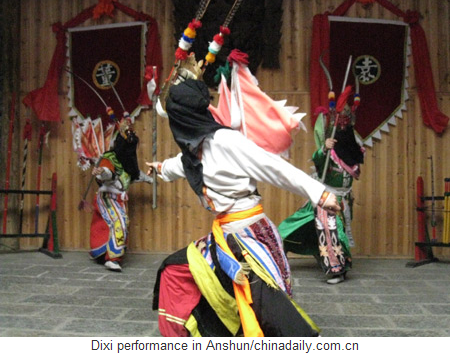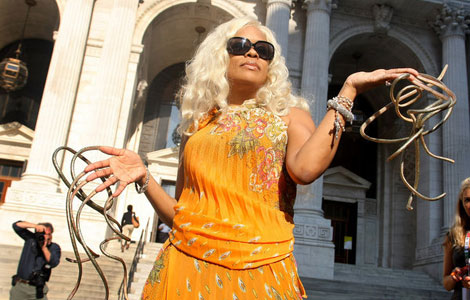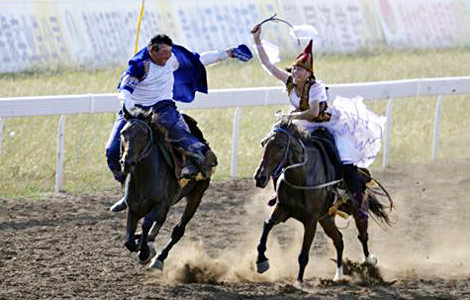Opera lawsuit director acquitted of copyright infringement
Updated: 2011-09-14 21:47
By Guan Xiaomeng (chinadaily.com.cn)
|
|||||||||||
The first case brought on court in an attempt to enforce China's Intangible Cultural Heritage Protection Law has ended with the plaintiff's disappointment over a ruling in relation to a wrongly-titled but unprotected piece of heritage.
The Beijing Intermediate People's court, in its final judgement, acquitted internationally-acclaimed director Zhang Yimou of the charges relating to suspected copyright infringement of Anshun city's local opera, Dixi, and rejected the plaintiff's request to title the opera featured in Zhang's film as "Anshun Dixi" on Wednesday. Anshun Dixi was listed as national intangible cultural heritage opera in 2006.
In May 2010, the city culture authority of Anshun from Southwest China's Guizhou province took Zhang, as well as film producer Zhang Weiping and the film distribution company, to court for using footage of Anshun Dixi in one of Zhang's films but not to credit the opera to Anshun. The plaintiff was ruled against this May, and subsequently appealed to higher court.
"This is a kind of 'Yunnan mask opera'", said the subtitle in Zhang's 2005 film Riding Alone for Thousands of Miles when footage of the Anshu Dixi opera is played to support the plot. Without any form of credit linking the opera to Anshun the plaintiff argued that the film misled viewers, as it gave the impression the opera could be found in Yunnan, not Anshun.

Zhan Xueyan, leader of a local Dixi performing troup and one of the Dixi performers in Zhang's film appeared in the court as a witness. He said Zhang's crew invited eight of their performers to Lijiang in Yunnan to shoot two plays of Anshun Dixi. "What we performed in the film is exactly the original version of two plays of our traditional Dixi," he told the court.
Li Jun, the plaintiff's attorney played the film in court to show that Dixi had been used in the film. Li said in the indictment that his client has no objection to using "friction" based on Anshun Dixi, as the defendant cited in the first trial, but said that it was the fault of the defendant for not mentioning that Dixi is from Anshun.
"With no crediting as Anshun Dxi, the audiences thought the opera in the film was created by Zhang Yimou instead of the national intangible cultural heritage Anshun Dixi. It harms the feelings of Anshun people," Li said in court.

The defendant's lawyer argued that Anshun Dixi is a folk opera that has been passed on from ancient times with no specific writer. "Since it is listed as national intangible culture heritage now, it belongs to the country and people so there is no civil right to a certain individual or party," the defendant's lawyer said.
The court ruled that "Anshun Dixi" is not a piece of work thus has no individual has right of authorship under the Copyright Law.
Dixi opera, known for its colorful masks and costumes, originated in Anshun city in Southwest China's Guizhou province and was listed as a national intangible cultural heritage in 2007. It dates back to the late 1300s when Emperor Zhu Yuanzhang of the Ming Dynasty stationed frontier forces in Anshun. The migrant population and their descendants created and developed the opera.
Zou Zhengming, director of Anshun's city culture authority said after the trial that they would carry on the effort to protect local cultural heritage, despite having lost the lawsuit. "What we want is really simple: to let the public know the opera in the film is from Anshun not Yunnan," he said. "We don't care whether we would win (the case) or not, it will be enough to bring public attention to intangible culture heritage protection and the legislation."
Hot Topics
Organ transplant bonds mother and son
Editor's Picks

|

|

|

|

|

|







